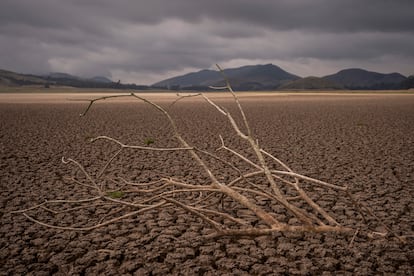Colombia considers first law on climate refugees in Latin America
A new bill is proposing that the government recognize ‘the existence of forced internal displacement due to causes associated with climate change and environmental degradation’


In 2005, when the climate crisis was not yet a major political issue, British professor Norman Myers released the findings of an in-depth study, which estimated that there would by 200 million climate-induced refugees by 2050. It was a divisive figure, sparking both criticism and support. Some even suggested he had underestimated the number, arguing that there would be one billion climate refugees by that year.
Despite its naysayers, the study brought the issue of climate displacement to the fore. It is a problem that is now being discussed with even more concern. Humans have traditionally migrated — choosing to stay in or leave a place depending on its climatic conditions — but temperatures are now rising to such extremes that governments and researchers are alarmed about how this will impact communities.
Now, 18 years after Myers made his famous estimate, Colombia is seeking to become the first country in Latin America with a law that covers climate displacement. But there is still a long way to go: the measure has only been approved in the first debate of the four required to pass the bill.
The proposed law — which has been brought forward by lawmakers Julia Miranda (New Liberalism), Duvalier Sánchez (Green Alliance) and Daniel Carvalho (Independent) — proposes that the Colombian government “recognize the existence of forced internal displacement due to causes associated with climate change and environmental degradation.”
But talking about climate-induced displacement is not an easy subject — not only because of its implications, but also because it is difficult to define who falls into that category. It is logical to think that this definition will cover someone who has been forced to move due to a hurricane or climate-related disasters. But as international researchers such as Dominic Kniveton point out, these migrations — even those linked with climate change — are the result of a decision-making process that takes into account a number of other factors.
Others argue that the definition should be broader. For example, a study published in the Journal of Environmental Economics and Management found a strong link between migration and agriculture. When there is drought, there are no crops, and with no crops, there is no way for people to make a living, and they are forced to move. That’s why one of the most critical points of the bill revolves around how to define an individual who has been internally displaced due to the climate.
As it stands now, the bill states: “Forced internal displacement due to causes associated with climate change and environmental degradation is understood as forced human mobility of a person, families or social groups who are forced to move from their territory, abandoning their place of habitual residence, family and social nucleus, their economic activity and/or means of subsistence as a result of or to avoid the effects of natural disasters or climate change.”
Clara De La Hoz Del Real, a sociologist and specialist in climate migration, says the definition of climate displacement should be considered very carefully and put up for social debate to ensure that it is not stigmatized.
“Constructing categories is a social process that in this case implies assigning certain rights to the people affected, but should not take away from others,” she explains. “In Colombia, the category of displacement, and the institutionally constructed figure of the displaced, come with political and social disadvantages — stigmatization, victimization and exclusions that reflect the domination of those who formulate and assign these labels over those to whom they are assigned.”
“For this reason, creating a category must be done not only by state actors, but also from a societal, inclusive and horizontal approach, to ensure the state’s intention and intervention is not harmful,” she continues, adding that the government should also not forget its responsibility to address climate change and associated problems, such as natural disasters.
For Mauricio Madrigal, the head of environment and public health at the Universidad de los Andes, the bill should also take into account how forced displacement is “a legal figure that makes visible how climate change effectively violates human rights.” He adds that the policy must be able to bring together risk management, the environment and the housing sector. “It’s a very complex issue that should not necessarily be seen as something negative when it is technically categorized,” he explains, adding that migrating due to climate change can be seen as a process of human adaptation.
What awaits Colombia now is a long and in-depth debate.
Sign up for our weekly newsletter to get more English-language news coverage from EL PAÍS USA Edition
Tu suscripción se está usando en otro dispositivo
¿Quieres añadir otro usuario a tu suscripción?
Si continúas leyendo en este dispositivo, no se podrá leer en el otro.
FlechaTu suscripción se está usando en otro dispositivo y solo puedes acceder a EL PAÍS desde un dispositivo a la vez.
Si quieres compartir tu cuenta, cambia tu suscripción a la modalidad Premium, así podrás añadir otro usuario. Cada uno accederá con su propia cuenta de email, lo que os permitirá personalizar vuestra experiencia en EL PAÍS.
¿Tienes una suscripción de empresa? Accede aquí para contratar más cuentas.
En el caso de no saber quién está usando tu cuenta, te recomendamos cambiar tu contraseña aquí.
Si decides continuar compartiendo tu cuenta, este mensaje se mostrará en tu dispositivo y en el de la otra persona que está usando tu cuenta de forma indefinida, afectando a tu experiencia de lectura. Puedes consultar aquí los términos y condiciones de la suscripción digital.








































